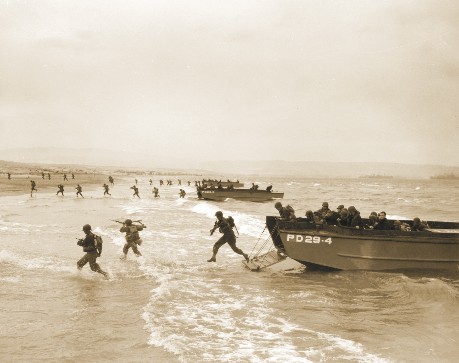
Reflections on D-Day
BGen Stephen A. Cheney, USMC (Ret) and Matthew Wallin
Today marks the 70th Anniversary of D-Day, the largest amphibious invasion in history. On that day over 150,000 troops landed in German-occupied France, and thousands never returned home.
The acts of heroism and bravery that took place that day are now the stuff of legends. From the Rangers scaling the cliffs at Point-du-Hoc, and the Airborne troops dropped hours in advance of the beach landings, to the long slog through the hedgerows of Normandy, the sacrifices made before, on and after that day should never be forgotten. The human capital and ingenuity applied to breach Hitler’s Atlantic Wall stand as a testament to the success of that day and to the resources America and her Allies devoted to further the cause of freedom.
But D-Day was neither the beginning nor the end of the fight. D-Day was the culmination of all the sacrifice that had occurred up to that point, and the prelude to much more.
And it was not the only D-Day of that war. As American and Allied troops fought the island hopping campaign throughout the Pacific, our soldiers, sailors, airmen and Marines faced d-day after d-day after d-day.
In remembering the sacrifices made by the men on that day of days, we should also reflect on the missions we currently ask of our servicemen and women today. The enemy might be different, and the battles might be different, but the sacrifices they make in our name remains much the same. It is that sacrifice that binds together generations of Americans who fight for their country.
Today, the young men who fought on D-Day are well into their 90s or older, living in a very different world than the one in which they fought—because they fought. We owe it to them to carry forth not only the memory of what they did, but the spirit of what they did it for. We also owe it to them to make sure that current and future generations, while appreciative of their history, are sent into harm’s way only as a last resort—and backed up by the dedicated support of our nation before, during, and after the wars they fight in our name.
As we look to the future, Americans should be mindful of all the elements that comprise our national power: military, diplomatic, economic, technological, cultural and intellectual. It is up to us to support these elements, especially those which allow America to secure its national interests without resorting to the use of force. That is our duty: to learn the lessons of the past and leverage every strength we have, so that when we are left with no choice but to send our best into harm’s way, we know—and they know it—is the right choice to make.






[…] Reflections on D-Day […]
[…] to better protect the areas most affected by the flooding and storm surges of Hurricane Sandy. Reflections on D-DayBGen Stephen A. Cheney, USMC (Ret) and Matthew Wallin / American Security ProjectToday marks the […]